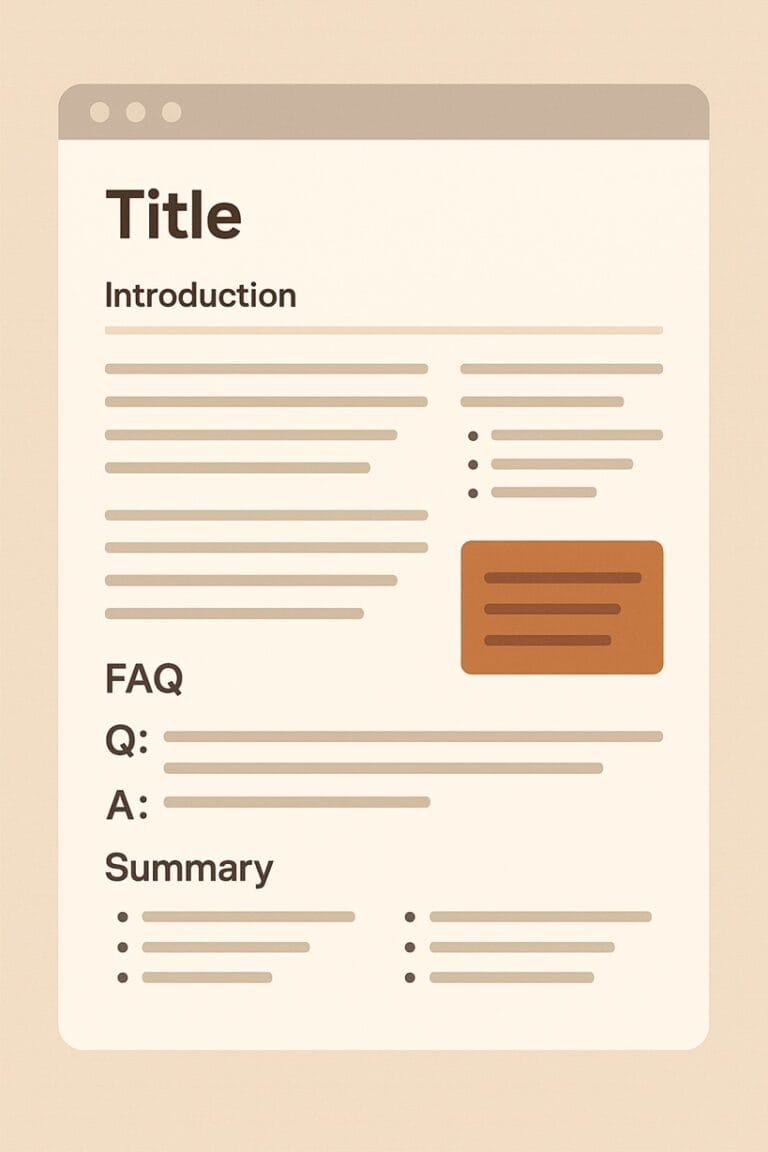AI Tools for Blogging Success: 8 Essential Hacks
“The key to successful AI content is human oversight—AI drafts, humans craft.” — Neil Patel, SEO and Digital Marketing Influencer
Are you struggling to keep up with your blog schedule, boost your SEO rankings, or consistently create engaging content? You’re not alone. Thousands of new indie authors face these same challenges every day. Fortunately, AI tools for blogging have emerged as a powerful partner, helping authors streamline content creation, improve search engine optimization, and drive targeted web traffic. But can AI-generated content resonate with your readers and authentically build your author brand?
In this writer’s guide in our series on using AI tools, we’ll explore how your specific blogging goals, audience understanding, and content context influence whether AI tools are your best choice. You’ll discover practical strategies for integrating tools into your workflow, equipping you with the knowledge to effectively evaluate AI tools and navigate ethical considerations confidently. We’ll also debunk common AI myths, share relatable indie author examples, and provide actionable steps to help you leverage AI strategically.
By the end of this guide, our aim is for you to have gained clarity and confidence about when and how to use AI tools for blogging to enhance your success.
Clarify Your Blog’s Goals First
Before deciding who or what should write your next blog post, clearly define your primary objectives. Different goals align better with either AI or human writing. Suppose your main goal is to increase web traffic and improve SEO visibility. In that case, AI tools for blogging can be incredibly effective. Platforms like Jasper and ChatGPT quickly analyze trending keywords and generate optimized first drafts, saving you hours of research. Indie author Mike, for example, tripled his blog traffic by using AI-generated content to capture trending search topics quickly.
However, if your priority is building brand loyalty and authentic reader engagement, human writers typically excel. New indie novelist Sarah builds powerful reader relationships by sharing personal stories, insights, and emotional depth that resonate deeply with her audience, something AI struggles to replicate. When your readers expect detailed, expert-level analysis, human expertise shines brightest.
New indie non-fiction author Jake regularly positions himself as an expert voice through thoroughly researched, human-crafted articles. Human-written content allows him to leverage his unique knowledge and build credibility. For rapidly changing news or trends, AI tools for blogging deliver immediate value. New indie tech blogger Elena uses AI to quickly summarize breaking industry news, ensuring her readers get timely information ahead of competitors.
Quick takeaway:
Clearly define your blogging goals first, then match them appropriately with AI’s speed and optimization or human depth and authenticity.
Understand Your Audience to Match Your Voice
Your blog’s audience strongly influences whether AI tools for blogging or human-written content will resonate most effectively. AI-generated content often suffices for broad, general audiences, especially for straightforward, informative topics. AI tools can produce readable, engaging content appealing to a wide range of readers.
However, specialized audiences like industry professionals or niche enthusiasts typically prefer human-written content. Human writers tailor content to address specific interests, knowledge levels, and expectations, ensuring deeper resonance. Indie gardening expert Laura, for instance, uses human-written content to engage her niche audience deeply, personally answering reader questions and creating a loyal, interactive community.
Suppose your blog aims to foster interactive engagement through comments or social media discussions. In that case, human writers provide a more authentic, relatable voice. They can respond genuinely to reader feedback and adapt content, building trust and connection.
Analyze Your Content’s Context Carefully
The subject matter, tone, and publishing platform also shape your choice between AI and human writers. For technical subjects requiring high accuracy, human expertise ensures precision and reliability. While AI tools can maintain a consistent, formal tone, human writers uniquely express diverse emotional and creative subtleties, from humor to inspiration.
Also, consider your publishing platform and format. Human creators excel at integrating multimedia elements, such as infographics, videos, and podcasts. AI tools for blogging can assist effectively by generating initial drafts or supplementary text. New indie podcaster Jeff collaborates with human designers for multimedia-rich posts, leveraging AI for show notes and supporting SEO content.
Practical Steps to Integrate AI into Your Workflow
Many new indie authors successfully blend AI tools and human creativity by strategically integrating AI into their workflow. AI was used in several stages of developing this writer’s guide, demonstrating firsthand how effectively AI and human collaboration can work.
You can integrate AI practically by:
- Using AI tools for initial research and topic ideation.
- Creating outlines or first drafts with AI, followed by human refinement.
- Optimizing content through AI-generated SEO recommendations.
- Enhancing editing and proofreading efficiency using AI grammar and readability tools.
Evaluating and Selecting AI Tools for Blogging
When choosing AI tools, indie authors should consider cost-effectiveness, ease of use, and customization options relevant to their niche. Popular tools new indie authors frequently recommend include Jasper (drafting), Grammarly (readability), SurferSEO (SEO optimization), and ChatGPT (research and ideation).
Ethical and Legal Considerations for Indie Authors
Using AI ethically builds reader trust and protects your author brand. Prioritize originality by always editing and personalizing AI-generated content. Consider transparency. Decide how openly you want to communicate AI use to your readers. Always verify facts and data accuracy, as AI tools can sometimes produce inaccuracies.
Navigating Common AI Challenges
Common challenges new indie authors face with AI include losing their authentic voice, producing superficial content, and introducing inaccuracies. New indie fantasy author Edward initially struggled with AI-generated content, which felt flat. He overcame these challenges by thoroughly revising drafts to reflect his unique voice, adding personal anecdotes, and producing engaging content.
To address these pitfalls, always personalize AI-generated drafts, edit thoroughly to add depth and originality, and rigorously fact-check before publishing.
Measuring Your AI Content Strategy’s Success
Evaluate your AI-enhanced blog strategy by tracking increased blog traffic, improved reader engagement (comments, shares, time-on-page), and higher conversion rates (subscriptions, book sales). Tools like Google Analytics, SEMrush, and Ahrefs can help measure these key performance indicators.
AI Writing Myths vs. Facts
Many new indie authors hesitate to use AI tools for blogging due to common misconceptions. Some believe AI content always feels robotic, but thoughtful human editing creates natural, engaging content from AI drafts. Others fear AI will replace human creativity entirely. Still, AI actually complements human creativity, freeing authors from repetitive tasks to focus on high-impact writing activities.
Future Trends: AI’s Evolving Role for Indie Authors
As AI evolves, new indie authors should anticipate improved emotional intelligence and personalization in AI-generated content, enhanced multimedia content generation capabilities, and increasingly seamless integration into writing workflows. Staying informed and adaptable ensures you leverage AI’s growing capabilities effectively.
Your Next Steps in AI Tools for Blogging
Choosing between AI and human writers isn’t an either-or decision. It’s about balance and strategic integration. Clearly define your blogging goals, thoroughly understand your audience, and thoughtfully analyze the context of your content. Leverage AI’s strengths in efficiency, SEO optimization, and speed, while embracing human creativity for authenticity, emotional depth, and genuine reader connection.
Your Actionable Steps
- Define your specific blogging goals clearly.
- Experiment with recommended AI tools (Jasper, Grammarly, ChatGPT) to streamline your workflow.
- Regularly assess the effectiveness of your strategy through clear KPIs.
- Continuously balance AI-generated efficiency with human-crafted authenticity.
Embrace AI confidently. It’s here to empower, enhance, and inspire your indie author journey.
We hope you’ve found the writer’s guide strategies useful and motivating. We hope they’ll equip you with the insights and tools needed to help you succeed as a new author.
For more guidance, see other writer’s guides, such as Engaging AI-Generated Content: 6 Secrets or AI Empowers New Indie Authors: 5 Best Hacks. You might also like Outcome-Based Management: 7 Steps to Writing Success.
Writing is a journey of continuous learning and improvement. You don’t have to go it alone. We’re excited to continue the journey with you, providing guidance and encouragement every step of the way. Our goal is to provide essential insights and practical advice to help you navigate the writing world with increased confidence.
If you have a draft you want to publish and are wondering how AI can help, read it. Is Your Book Ready to Self-Publish? Lastly, for help writing a non-fiction book, read Write Your First Non-Fiction eBook: a 30-Day Workbook for Getting It Done.
Don’t wait. Start today!
How can we help? To let us know, please fill out our Contact form. Happy writing!
FAQs
Here are five frequently asked questions (FAQs) new indie authors often have about AI-generated content, providing deeper insights and enhancing your understanding of the topics covered in this writer’s guide.
How much editing is usually required after AI generates my blog content?
Answer:
AI-generated content typically requires moderate to substantial editing, depending on your quality standards and audience expectations. Expect to spend time refining the AI-generated draft to improve readability, ensure factual accuracy, and infuse your unique author voice. Experienced indie authors often dedicate at least 15–30 minutes per AI-generated article to ensure authenticity and engagement.
Will using AI-generated content negatively impact my blog’s SEO performance?
Answer:
Not necessarily. Poorly implemented AI-generated content, such as repetitive or thin articles, can harm SEO rankings. However, thoughtfully edited and optimized AI-generated content can significantly enhance SEO performance. Always ensure your content provides genuine value, utilizes relevant keywords naturally, and meets reader intent to achieve positive SEO results.
Should indie authors disclose to readers when blog content is AI-generated?
Answer:
Transparency about AI use depends on your personal brand values and reader expectations. Many indie authors openly disclose AI collaboration to maintain reader trust, while others prefer to keep their process private. If your relationship with readers is based on authenticity and transparency, openly sharing your process can build stronger connections.
Can AI-generated blogs help indie authors build their email subscriber list?
Answer:
Yes, when used strategically. AI-generated content helps you consistently create keyword-rich, traffic-driving blog posts that attract readers. Pair these posts with compelling, human-crafted opt-in offers (like exclusive resources or guides) to convert blog visitors into loyal subscribers. This combination leverages AI’s efficiency while maintaining the human touch essential for subscriber growth.
How do I ensure AI-generated content matches my author brand’s tone and voice?
Answer:
Most AI tools allow you to input style prompts or examples of your preferred tone. Provide clear instructions and examples of previous content that reflect your authentic voice. Then, manually refine AI-generated drafts. Over time, the AI system will become increasingly familiar with your preferences, requiring fewer edits for subsequent posts.


